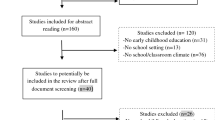Abstract
In this forum, I extend Tao, Oliver, and Venville’s paper Chinese and Australian children’s understanding of the earth: a cross cultural study of conceptual development to discuss the different views on culture and cultural mediation. I tease out nuances in the viewpoints to suggest three ways to theoretically frame studies examining cultural mediation of students’ cognition. Specifically, cultural mediation may be attributed to innate psychological attributes, an accretion of cultural elements, or the social interaction process. Each of these ideas represents a theoretical lens and has implications for the research design of studies relating cultural mediation to cognition. In the final section of this forum paper, I show how a study conducted from the symbolic interactionist viewpoint underscoring cultural mediation as a social interaction process might unfold.



Similar content being viewed by others
References
Blumer, H. (1969). Symbolic interactionism: Perspective and method. Berkeley, CA: University of California Press.
Cole, M. (1998). Cultural psychology: A once and future discipline. Cambridge, MA: Harvard University Press.
D’Andrade, R. (1989). Cultural sharing and diversity. In R. Bolton (Ed.), The content of culture: Constants and variants: Studies in honor of John, M. Roberts (pp. 349–362). New Haven, CN: HRAF Press.
D’Andrade, R. (1990). Some propositions about the relationship between culture and human cognition. In J. W. Stigler, R. A. Shweder, & G. Herdt (Eds.), Cultural psychology: Essays on comparative human development (pp. 65–129). New York, NY: Cambridge University Press.
Dewey, J. (1938). Experience and education. New York, NY: Macmillan.
Geertz, C. (1973). The interpretation of cultures. New York, NY: Basic.
Goffman, E. (1959). The presentation of self in everyday life. NY: First Anchor Books.
Gutiérrez, K. D., & Rogoff, B. (2003). Cultural ways of learning: Individual traits or repertoires if practice. Educational Researcher, 32, 19–25.
Hutchins, E. (1995). Cognition in the wild. Cambridge, MA: The MIT Press.
Ladson-Billings, G. (1995). Toward a theory of culturally relevant pedagogy. American Educational Research Journal, 32, 465–491.
Liebeck, H., & Pollard, E. (1994). The Oxford paperback dictionary (4th ed.). Oxford: Oxford University Press.
Mandler, G. (1985). Cognitive psychology: An essay in cognitive science. Hillsdale, NJ: Erlbaum.
Meyer, X., & Crawford, B. A. (2011). Teaching science as a cultural way of knowing: Merging authentic inquiry, nature of science, and multicultural strategies. Cultural Studies in Science Education, 6, 525–547.
Moje, E. B. (2008). Everyday funds of knowledge and school discourses. In M. Martin-Jones, A. M. de Mejia, & N. H. Hornberger (Eds.), Encyclopedia of language and education second edition discourse and education (Vol. 3, pp. 341–355). New York, NY: Springer.
Rumelhart, D. (1978). Schematic: The building blocks of cognition. In R. Spiro, B. Bruce, & W. Brewer (Eds.), Theoretical issues in reading comprehension. Hillsdale, NJ: Erlbaum.
Sewell, W. H., Jr. (1992). A theory of structure: Duality, agency, and transformation. The American Journal of Sociology, 98, 1–29.
Teo, T. W., & Osborne, M. (2012). Using symbolic interactionism to analyze a specialized STEM high school teachers experience in curriculum reform. Cultural Studies of Science Education. doi:10.1007/s11422-011-9364-0. Online First.
The Macquarie Dictionary and Thesaurus. (Ed.) (1991). Macquarie: Australia’s national dictionary. Sydney: Macquarie Library.
Tobin, K. (2005). Urban science as socially and culturally adaptive practice. In K. Tobin, R. Elemsky, & G. Seiler (Eds.), Improving urban science education: New roles for teachers, students, & researchers (pp. 21–42). Lanham, MD: Rowman & Littlefield.
Villegas, A. M., & Lucas, T. (2002). Culturally responsive teachers: Rethinking the curriculum. Journal of Teacher Education, 53, 20–32.
Vygotsky, L. S. (1929). The problem of the cultural development of child. The Pedagogical Seminary and Journal of Genetic Psychology, 36, 415–432.
Vygotsky, L. S. (1978). Mind and society: The development of higher mental processes. Cambridge, MA: Harvard University Press.
Wartofsky, M. (1973). Models. Dordrecht, The Netherlands: D. Reidel.
Wertsch, J. W. (2007). Mediation. In H. Daniels, M. Cole, & J. W. Wertsch (Eds.), The Cambridge companion to Vygotsky (pp. 179–192). New York, NY: Cambridge University Press.
Williams, R. (1973). Keywords. Oxford, UK: Oxford University Press.
Author information
Authors and Affiliations
Corresponding author
Additional information
Lead Editor: Aik Ling Tan
This Forum paper responds to issues raised in Tao, Oliver, and Venville (2012). Chinese and Australian children’s understandings of the Earth: A cross cultural study of conceptual development. doi:10.1007/s11422-012-9415-1.
Rights and permissions
About this article
Cite this article
Teo, T.W. Different perspectives of cultural mediation: implications for the research design on studies examining its effect on students’ cognition. Cult Stud of Sci Educ 8, 295–305 (2013). https://doi.org/10.1007/s11422-012-9437-8
Received:
Accepted:
Published:
Issue Date:
DOI: https://doi.org/10.1007/s11422-012-9437-8




